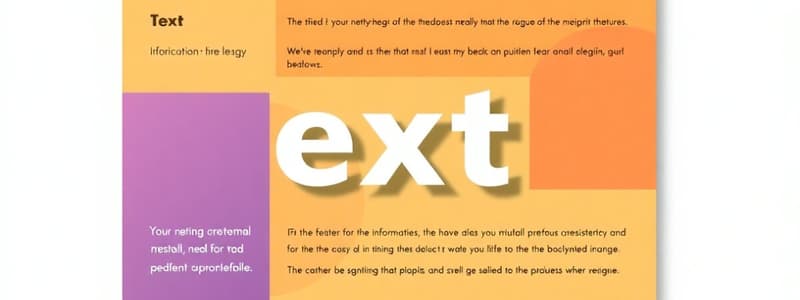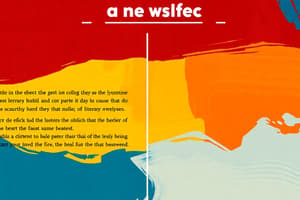Podcast
Questions and Answers
What does a cause and effect structure primarily demonstrate?
What does a cause and effect structure primarily demonstrate?
- A detailed description of an event.
- The similarities and differences between ideas.
- The chronological order of events.
- How certain actions lead to particular outcomes. (correct)
Which organizational aid helps readers locate specific parts of a written work?
Which organizational aid helps readers locate specific parts of a written work?
- Glossary
- Index (correct)
- Headings
- Preface
What is the main purpose of using graphics in informational texts?
What is the main purpose of using graphics in informational texts?
- To condense and clarify large amounts of information. (correct)
- To enhance the creative writing aspect of the text.
- To provide complex opinions about the subject.
- To create a detailed narrative of events.
In a compare and contrast structure, what is evaluated?
In a compare and contrast structure, what is evaluated?
Which feature is NOT commonly used to highlight important areas of information in a text?
Which feature is NOT commonly used to highlight important areas of information in a text?
What defines the chronological order structure in informational writing?
What defines the chronological order structure in informational writing?
Why is it important to distinguish between facts, persuasion, and informed opinions?
Why is it important to distinguish between facts, persuasion, and informed opinions?
What role does a descriptive structure play in informational texts?
What role does a descriptive structure play in informational texts?
What is the purpose of using a table of contents in a document?
What is the purpose of using a table of contents in a document?
Which form of persuasion appeals specifically to emotions?
Which form of persuasion appeals specifically to emotions?
What distinguishes a biography from an autobiography?
What distinguishes a biography from an autobiography?
Which document established a legal form of self-government for the Pilgrims?
Which document established a legal form of self-government for the Pilgrims?
What was the primary aim of the Letter from Birmingham Jail?
What was the primary aim of the Letter from Birmingham Jail?
Which of the following is NOT a type of literary nonfiction?
Which of the following is NOT a type of literary nonfiction?
What is the significance of the Bill of Rights?
What is the significance of the Bill of Rights?
Which of the following describes narrative journalism?
Which of the following describes narrative journalism?
What aspect of social contract theory was emphasized by John Locke?
What aspect of social contract theory was emphasized by John Locke?
What did Martin Luther King Jr. express disappointment about in his letter?
What did Martin Luther King Jr. express disappointment about in his letter?
What moral stance was highlighted in Thoreau's essay 'Civil Disobedience'?
What moral stance was highlighted in Thoreau's essay 'Civil Disobedience'?
What key principle does Thoreau's concept of civil disobedience emphasize?
What key principle does Thoreau's concept of civil disobedience emphasize?
Which literary movement was Thoreau associated with that influenced his ideas?
Which literary movement was Thoreau associated with that influenced his ideas?
How did Thoreau suggest that individuals could protest against injustice?
How did Thoreau suggest that individuals could protest against injustice?
Which of the following figures were notably influenced by Thoreau's essay on civil disobedience?
Which of the following figures were notably influenced by Thoreau's essay on civil disobedience?
What is one of the first steps in 'reading' artistic media, according to the content?
What is one of the first steps in 'reading' artistic media, according to the content?
What aspect of an artwork does the context include when interpreting its meaning?
What aspect of an artwork does the context include when interpreting its meaning?
Flashcards
Informational Text Structure
Informational Text Structure
The way an author organizes information in a nonfiction text.
Cause and Effect Structure
Cause and Effect Structure
Shows how one event causes another.
Compare and Contrast Structure
Compare and Contrast Structure
Highlights similarities and differences between things (people, ideas, places, etc.).
Chronological Order
Chronological Order
Signup and view all the flashcards
Problem and Solution
Problem and Solution
Signup and view all the flashcards
Descriptive Structure
Descriptive Structure
Signup and view all the flashcards
Supplemental Features
Supplemental Features
Signup and view all the flashcards
Print Features
Print Features
Signup and view all the flashcards
Organizational Aids
Organizational Aids
Signup and view all the flashcards
Civil Disobedience
Civil Disobedience
Signup and view all the flashcards
Transcendentalism
Transcendentalism
Signup and view all the flashcards
Reading Visual Media
Reading Visual Media
Signup and view all the flashcards
Artistic Choices
Artistic Choices
Signup and view all the flashcards
Contextual Analysis
Contextual Analysis
Signup and view all the flashcards
Interpreting Visual Art
Interpreting Visual Art
Signup and view all the flashcards
Persuasion Techniques
Persuasion Techniques
Signup and view all the flashcards
Logos
Logos
Signup and view all the flashcards
Pathos
Pathos
Signup and view all the flashcards
Kairos
Kairos
Signup and view all the flashcards
Literary Nonfiction
Literary Nonfiction
Signup and view all the flashcards
Nonfiction Essay
Nonfiction Essay
Signup and view all the flashcards
Personal Narrative Nonfiction
Personal Narrative Nonfiction
Signup and view all the flashcards
Biography
Biography
Signup and view all the flashcards
Autobiography
Autobiography
Signup and view all the flashcards
Social Contract Theory
Social Contract Theory
Signup and view all the flashcards
Study Notes
Informational Text Structures
- Informational texts convey information or build on prior knowledge.
- Cause and effect: Shows how actions lead to events.
- Compare and contrast: Highlights similarities and differences between subjects.
- Chronological order: Presents events in their sequence.
- Problem and solution: Outlines a situation and its resolution.
- Descriptive structure: Uses descriptive language to bring an event to life.
Informational Text Features
- Informational texts are organized.
- Supplemental features enhance understanding.
- Print features: Table of contents, preface, index, glossary.
- Organizational aids: Different fonts, bold/color/italics, headings/subheadings, bullets/margin notes.
- Illustrations/graphics: Photographs, drawings, graphs, tables, maps, diagrams to condense complex information.
Evaluating Information
- Distinguishing facts, persuasion, and informed opinions is crucial.
- Facts: Proven ideas.
- Persuasion: Convincing the audience to think a certain way.
- Types of persuasion: Big names, logos (numbers/data), pathos (emotions), kairos (urgency).
- Informed opinions: Judgments based on all sides of an argument.
Literary Nonfiction
- Literary nonfiction (creative nonfiction): Fact-based writing using fiction techniques like plot, characters, setting, descriptive imagery, figurative language, tone.
- Types of literary nonfiction:
- Nonfiction essays (expository, personal, persuasive).
- Personal narrative nonfiction (autobiographies, memoirs, diaries, journals, letters, biographies).
- Science writing.
- Narrative journalism (current events, travel, sports, food).
- Narrative history.
Types of Nonfiction
- Nonfiction: True or factual writing.
- Types:
- Informational nonfiction: Factual texts (self-help, guides, academic texts, journalism).
- Literary nonfiction: Fact-based writing with literary elements (biographies, autobiographies).
Key Historical Documents
- Mayflower Compact: 1620, established self-government.
- Social contract theory: Agreement between people and leaders.
- Declaration of Independence: 1776, declared American independence.
- Articles of Confederation: 1777, first U.S. constitution.
- U.S. Constitution: 1787, outlines government powers.
- U.S. Bill of Rights: First ten amendments.
- Gettysburg Address (1863).
- Emancipation Proclamation: 1863, freed slaves in Confederate states.
Civil Rights Movement
- Martin Luther King Jr. arrest in Birmingham, Alabama: Protest against segregation and police brutality.
- King's beliefs and influences: Admiration for Jesus and Lincoln, belief that extreme action may sometimes be warranted.
- Letter from Birmingham Jail: King's response to clergymen's criticism.
- Groups King was disappointed in: Middle-class Blacks, white moderates, Black separatists.
- Letter from Birmingham Jail Significance: Crucial civil rights moment.
Civil Disobedience
- Henry David Thoreau's "Civil Disobedience" (1849): Protested slavery & Mexican-American War through tax refusal.
- Thoreau's Influences: Abolitionist family, Transcendentalism (individualism, spirituality, self-reliance).
- Key concepts: Non-violence, individual protest against injustice, tax refusal as a form of protest.
- Influence on later movements: Mahatma Gandhi, Martin Luther King Jr.
Reading Artistic Media
- Reading a piece of visual media:
- Literal interpretation (what it shows).
- Artistic choices (color, composition, materials, camera angles, techniques).
- Context (title, historical context, etc.).
- Understanding the work's meaning like understanding a book.
Studying That Suits You
Use AI to generate personalized quizzes and flashcards to suit your learning preferences.




